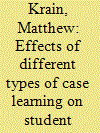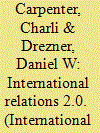|
|
|
Sort Order |
|
|
|
Items / Page
|
|
|
|
|
|
|
| Srl | Item |
| 1 |
ID:
097846


|
|
|
|
|
| Publication |
2010.
|
| Summary/Abstract |
Two types of case learning-case studies and problem-based learning-have become staples in our active learning international relations classrooms. Yet few teacher-scholars have examined whether different types of case learning yield different learning outcomes. This study examines the student engagement in response to four different types of case learning: case studies with texts designed for the case method, those using written nontraditional case materials, those incorporating documentary films as case materials, and problem-based learning approaches. I survey students in two International Political Economy classes as a way of yielding an indirect assessment of how effective or useful these different approaches are, and which types of case learning engaged students most. Results suggest that the types of case learning that engaged students' senses in multiple ways-problem-based learning and case studies using films as texts-enhanced their perceptions of the exercises' effectiveness. Case studies that relied on written texts alone were not rated as highly, although were still seen as extremely valuable. These results are consistent with the findings from the cognitive psychology literature that informs the active teaching and learning approach.
|
|
|
|
|
|
|
|
|
|
|
|
|
|
|
|
| 2 |
ID:
097840


|
|
|
|
|
| Publication |
2010.
|
| Summary/Abstract |
Why is it that some authorities, governments/administrations, and even entire regimes emerge from disasters more popular and politically stronger, while most appear to emerge less popular and politically weaker, sometimes fatally so? This paper argues that the often problematic political consequences of disasters can be understood more fully by seeing them as "Maslowian Shocks" with strong revelatory components where public estimation of government disaster response may be analyzed along six "5C+A" dimensions: capability, competence, compassion, correctness, credibility, and anticipation. The paper then illustrates the 5C+A framework with a set of cross-national examples and public opinion data from a 2001 post-earthquake survey in El Salvador.
|
|
|
|
|
|
|
|
|
|
|
|
|
|
|
|
| 3 |
ID:
097844


|
|
|
|
|
| Publication |
2010.
|
| Summary/Abstract |
The International Relations (IR) profession has not fully taken stock of the way in which user-driven information technologies-including Blogger, Facebook, Twitter, YouTube, and Wikipedia-are reshaping our professional activities, our subject matter, and even the constitutive rules of the discipline itself. In this study, we reflect on the ways in which our own roles and identities as IR scholars have evolved since the advent of "Web 2.0": the second revolution in communications technology that redefined the relationship between producers and consumers of online information. We focus on two types of new media particularly relevant to the practice and the profession of IR: blogs and social networking sites.
|
|
|
|
|
|
|
|
|
|
|
|
|
|
|
|
| 4 |
ID:
097842


|
|
|
|
|
| Publication |
2010.
|
| Summary/Abstract |
This study investigates how well women are represented at the International Studies Association's (ISA) annual meetings. It tracks women's participation in the roles of chairpersons, paper presenters, and discussants on the panels, roundtables, and poster sessions at five consecutive annual meetings. Additionally, the study investigates women's relative presence in the sessions sponsored by the various sections of the ISA and whether it makes a difference if women or men are the section's program organizers. The findings demonstrate that women are steadily increasing their presence at the ISA's annual meetings. The conclusion interprets this finding within the larger context of the field of international studies.
|
|
|
|
|
|
|
|
|
|
|
|
|
|
|
|
| 5 |
ID:
097845


|
|
|
|
|
| Publication |
2010.
|
| Summary/Abstract |
This article recounts the author's experience of teaching International Law as a "blended" or "hybrid" course. In hybrid teaching, a significant portion of the learning activities is moved online, and time traditionally spent in the classroom is reduced but not eliminated. The article first briefly reviews the literature on international law pedagogy. Next, it describes the particular context within which the author redesigned the author's traditional course. It thereafter highlights the key aspects of the author's redesigned course. Finally, it shares some practical lessons that the author has learned and more general conclusions that the author has reached in hybrid teaching.
|
|
|
|
|
|
|
|
|
|
|
|
|
|
|
|
| 6 |
ID:
097841


|
|
|
|
|
| Publication |
2010.
|
| Summary/Abstract |
This paper analyzes and assesses the "Principles for Stable Capital Flows and Fair Debt Restructuring in Emerging Markets," which have emerged as an important instrument for crisis prevention and crisis resolution in the international financial system. The paper argues that, notwithstanding their low profile, the Principles which were jointly agreed between key sovereign debtors and their private creditors in 2004 have proved to be a useful instrument in spite of their voluntary and non-binding nature. Indeed, an increasing number of sovereign debtors and private creditors have adopted the Principles' recommendations on transparency and the timely flow of information, close dialogue, "good faith" actions, and fair treatment. The paper, taking a rational choice perspective, appraises the Principles as the product of a transnational public-private partnership as well as a soft mode of governance. Moreover, it shows how the Principles have moved somewhat along the continuum of soft law and hard law toward the latter. Finally, the paper makes the case that the Principles and their design features can provide some lessons for the current international policy debate on codes of conduct in global financial regulation.
|
|
|
|
|
|
|
|
|
|
|
|
|
|
|
|
|
|
|
|
|